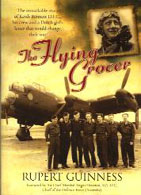 | Rupert Guinness THE FLYING GROCER Random House, 255 pp. Source: review copy Review by Tineke Hazel |
The Flying Grocer is the story of Keith Bennett, a young Australian pilot who flew 30 bombing missions from England over Germany towards the end of the second World War. One of those missions was part of Operation Manna, a food drop over Western Holland during the last five days of the European war.
Simply said but not simply done.
Rupert Guinness, the author, had wanted his father-in-law, Keith Bennett, to write down this remarkable story. Like most men of that generation who had seen the horrors of war, Bennett refused to even talk about that time of his life. After Bennett died, Guinness decided, with the blessing of Bennett's widow, to relate the story himself.
Guinness had access to war diaries, service records and personal letters. He did a lot of research into the training of Bennett as a pilot in Australia and England, and he goes into great detail about all the aircraft specifications, which annoyingly he quotes in metric instead of Imperial which would have been in use then. He gathers a lot of opinions about Bennett from flying mates and family, but somehow his subject remains a shadowy figure. Amongst the letters is one from Jannie van Splunder, a Dutch girl who thanks Keith and his mate Murray for the carton of cigarettes to which he had attached their addresses in Australia and included it in the food drop near Ridderkerk, where Jannie and her friend picked it up. She expresses her gratitude for her family and all the neighbourhood for the food which saved them from starvation. As a six year old I can remember standing on the corner of the Uddelstraat and Soestdyksekade in Den Haag with a group of silently crying neighbours, watching the Lancaster bombers dropping food parcels on the other side of Zuiderpark. My father was involved in the fair distribution of this life-saving food.
Jannie asks Bennett if she can send him anything as a Thank You, but he replies that her gratitude makes him feel the food drop makes some sort of amends for having been part of the bombing raids that destroyed Dresden. Their correspondence dwindles as both get on with their lives on opposite sides of the world.
In 1983 Bennett and his wife visit Jannie and her husband briefly. After Bennett's death Guinness visits Jannie and she shows him where the cigarette parcel was dropped, now a busy 4-lane highway. He had not been aware that the West of Holland had lost so many people in the Hungerwinter of 1944-45 due to the appalling conditions and lack of food.
Guinness has done a fine job of drawing attention to Operation Manna, so we can all remember these fine young men, who did a job to stop Hitler from totally destroying the world as they knew it.
It is interesting that little known facts about the second World War come to light through memories passed on to later generations. It is not a well-known fact that the 2/11th battalion of WA fought on Mt Thermopylae, and was part of a force that held back the Germans for long enough that their operation, Barbarossa, was a failure and ensured Hitler made the same mistake as Napoleon in finding his army bogged down in a fierce Russian winter. The 2/11th was driven back to Crete where they were made into an ANZAC corp and faced the German paratroopers dropping with swishing sound out of silent gliders. They killed many and would have held Crete if it hadn't been for lack of communications with the English command. The Allied command did not learn from this either, as they later made a disastrous drop on Ahrnem near the end of the war.
